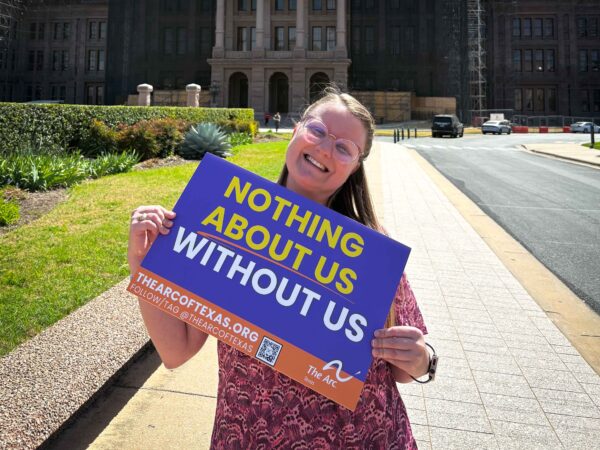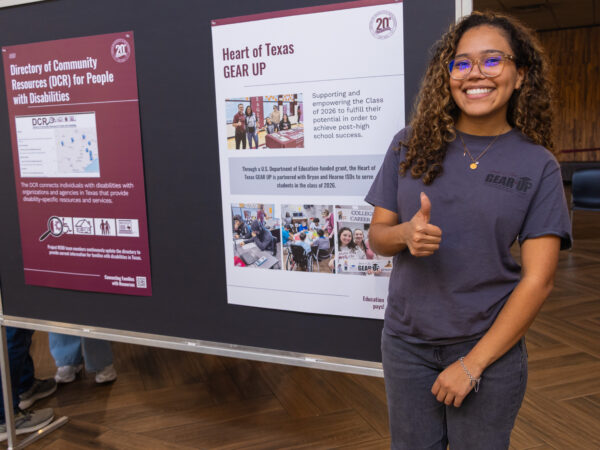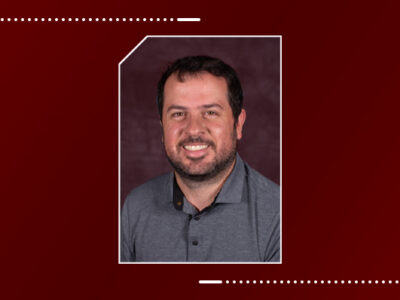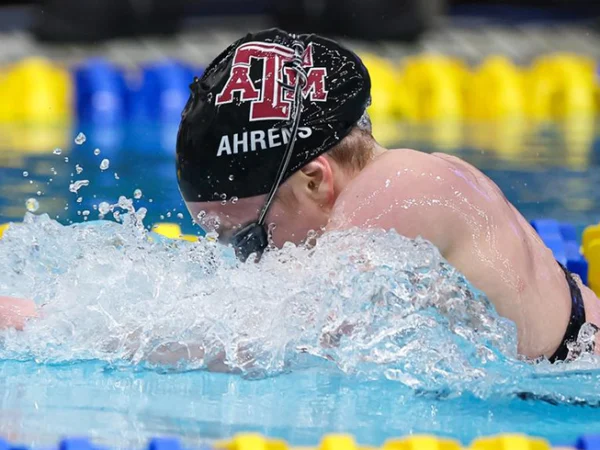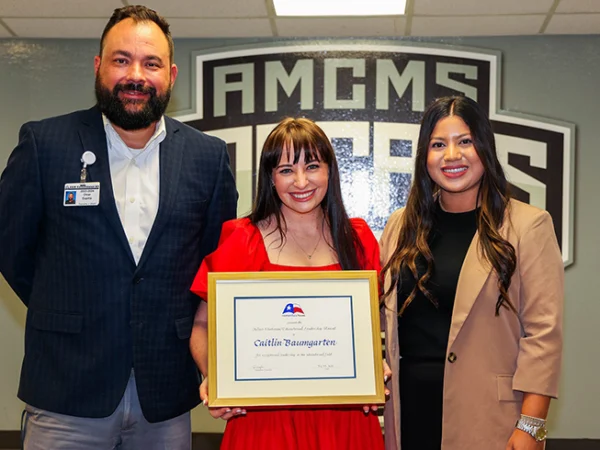
Classroom Instruction Comes To Life Through Global Education
Her past is not something she likes to talk about, but when Katrin Howard was asked to speak to a group of Texas A&M students, she could not pass up the opportunity.
Howard grew up in East Germany in the 1970s and 1980s. She had shared her story with her daughter, Kaitlin, a freshman B.S. in Education major, which prompted Kaitlin to sign up for a study abroad trip to Germany and France over spring break.
When Kaitlin shared her mom’s story with Dr. Cynthia Boettcher and Dr. Janet Hammer, they knew other students involved in the trip needed to hear it. Two weeks before leaving for Germany, Howard and her husband visited Dr. Boettcher and Dr. Hammer’s Teaching Writing in Elementary and Middle Grade Classroom class.
Howard was born in Bautzen, Germany. Just like most other children, she went to day care five days a week. After starting first grade, she was required to attend school six days a week. Howard recalls how difficult school was and how strict her teachers were.
“I’m left handed and always had a difficult time. Everyone who was left handed was forced to write with their right hand. I struggled and was a little behind.”
Howard grew up in an apartment with her parents, a brother and a sister.
“We had no heat. The winters were bitter cold and we woke up in the morning to our bedsheets frozen. Our ceilings were literally sheeted in ice,” she explained. “We did not change clothes every day because we didn’t have that many clothes. I never owned a pair of jeans until I immigrated to West Germany.”
Howard’s father was against the government and the push for everyone to act like proud East German citizens. On Friday evenings, he and his friends would go out and do propaganda.
“His propaganda was mostly taking newspaper clippings and putting them on buildings. The biggest thing he ever pulled was dumping blue paint over a statue in the middle of town. My mom was always worried about him being picked up and being put in jail.”
In August 1981, Howard and her family moved to West Germany. She remembers the train ride and the first thing she saw in West Germany – a gas station with a bright sign – nothing like she had ever seen in East Germany.
The most difficult transition for Howard was school. “I was an outcast. I looked different and had different clothes and didn’t fit in. It took me a while to adjust and make friends.”
Four years later, Howard moved to Florida. She worked at the Epcot Center at Disney World where she met her husband. When the Berlin Wall came down in 1989, Howard watched on television in disbelief.
“I was shocked because I never really thought it was going to happen,” she explained. “People left everything behind because they were just trying to get out because they were afraid the border would close again. Some people didn’t even know the wall came down for several days because they lived so far away.”
Howard’s story, along with other book talks, research projects and presentations, helped prepare the students for what they experienced in France and Germany.
“I think it teaches them about globalization. It personalizes everything. They can teach their children about the impact of going to other countries where you don’t know the language and you are having to navigate around,” explained Dr. Hammer.
Student Reflections:
“This trip meant more to me than gaining insight for my future career or being on vacation. I visit Germany almost every summer, but I do not tour a lot, especially larger cities. Touring all of these places changed my perspective on a lot of things I thought I already knew. I was not expecting such a deep connection with the sites we were touring. I learned a lot about history, but I also learned to be more appreciative, unbiased and most importantly, to accept the good and bad of the history of both my countries, Germany and the United States.”
“Being able to study abroad is an opportunity I will forever be thankful for. I made so many memories and learned so much from being able to see many historical sites in person. I personally feel like this trip taught me so much more than books ever could. Overall, the trip was the best experience of my life.”
“I am very excited to teach some of the information to my future students. I have already created a virtual field trip to show my current students. This trip would not have been possible without my amazing professors and Texas A&M University.”
“I believe that I learned way more than I expected during my time in France and Germany. I knew I would spend time learning about historical sites and artifacts, but I did not expect to learn so much about the culture and people of these countries as well. Even though I know that most of the places we visited are frequented by tourists, I felt as if the Berliners welcomed us with open arms. Similar to us, they are proud of where they come from and want to show the world that they are more than their ancestors.”
Sachsenhausen Concentration Camp:
“As I was walking through the grounds, I couldn’t help but think of the thousands of people who walked this same path before me. Possibly the thing that disturbed me most was the proximity of a village to the camp. I could not imagine living that close to a place where such horrible things occurred.”
Normandy American Cemetery:
“The immense amount of white crosses and Stars of David was overwhelming. I could not stop thinking that all of those men were fathers, sons or husbands. Some of them were not much older than I am when they died in battle. It truly honors the men who sacrificed their lives to fight for a free world. Monuments like these make me sincerely appreciate the United States. It was an experience I will never forget.”
About the Writer
Ashley is the Media Relations Coordinator and responsible for news coverage in the Department of Teaching, Learning and Culture as well as the Department of Educational Psychology.
Articles by AshleyFor media inquiries, contact Ashley Green.
Fundraising
To learn more about how you can assist in fundraising, contact Amy Hurley, Director of Development ahurley@txamfoundation.com or 979-847-9455






